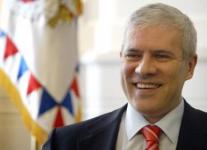 SERBIA
SERBIA
Serbian President Boris Tadic is launching a diplomatic and business offensive in Libya, in an effort to renew the previously strong ties between the two states.
During his stay in Tripoli, which is timed to coincide with celebrations marking the fortieth anniversary of the Libyan revolution, Tadic is to meet Libyan leader Moammar Gadaffi and other statesmen attending the festivities.
“Serbia is honoured to have been invited,” Tadic said. “It will be an opportunity for many informal conversations ahead of the [UN] General Assembly, and these kinds of meetings are often a lot more productive than formal talks,” he said.
Serbia hopes to win political support amongst African leaders for its refusal to recognise Kosovo’s independence.
So far, around 60 of 192 UN member states have recognised Kosovo.
Former Serbian ambassador to Tunisia Miodrag Jovanović told Serbia’s B92 that a number of the countries that recognised Kosovo’s Independence are African members of the Non-Aligned Movement, NAM, and that most will be represented by senior diplomats at the Tripoli ceremonies.
“Our president’s trip to Tripoli is part of the policy, begun in the last couple of years, which is restoring and bolstering ties with what has been something of a lost world for us over a long period. That’s the Non-Aligned world that we founded and later left,” Jovanovic said. He added that some NAM states are preventing Serbia from achieving its key goal, “preserving our territorial integrity”.
Yugoslavia was one of the key movers behind the formation of the NAM in the mid-1950s.
A military delegation will travel with Tadic to try to revive the defense relationship that once existed between the two countries.
Besides exporting Serbian arms, “we can offer the Libyans training, we can offer them treatment in our military hospitals, we can offer them training for their military doctors, officers etc.” military analyst Zoran Dragisic told B92.
The economic sanctions imposed on Serbia in the early 1990s cut exports to Libya that had included textiles and furniture. Libya had provided oil and oil derivates and was Yugoslavia’s leading African trade partner.
 Eurasia Press & News
Eurasia Press & News



